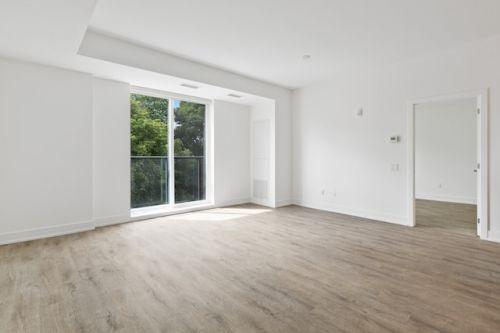Does your landlord want to evict you because of renovations? This renoviction may not be legal! Before you leave your home, take a few moments to learn more about this topic.
Renovations and evictions are among the most common causes of disputes between tenants and landlords. And when the former becomes an excuse for the latter, it's natural to question the validity of the situation.
Unfortunately, renovictions are still a source of frustration and distress for many tenants. One way to deal with this is to be better informed. Here's what you need to know.
What's the meaning of "renoviction" in Quebec?
Renoviction occurs when the owner of a building sends an eviction notice to one or more tenants, citing the need for major renovations. This is an illegal procedure because major renovations are not a valid reason to evict tenants.
Indeed, the law does not allow a tenant to be evicted because of renovations to the property. The tenant has the right to move back in once the work is completed. There are a few exceptions, however, which will be discussed in the next section.
Renovictions are usually done to increase the rent. Some landlords use this method to significantly raise the price of the property before finding a new tenant. This is a way of circumventing the annual rent limit imposed by the Tribunal administratif du logement.
Good to know
According to the scale of the Tribunal administratif du logement (formerly Régie du logement), a landlord can increase the rent for work carried out in the previous year. He cannot increase the rent in anticipation of renovations in the following year.

Can a tenant refuse renovation work?
Depending on the nature of the work, tenants can refuse access to their apartment, demand compensation or refuse to leave. However, they must have a valid reason for doing so, such as non-compliance with the conditions preceding the work.
For its part, the owner must respect certain conditions before carrying out the work. These vary according to the extent of the planned renovation. Except in emergencies, the landlord must give the tenant at least 24 hours' written or verbal notice and carry out the work between 7 a.m. and 7 p.m.
When can a tenant be evicted from an apartment?
Despite the tenant's right to remain in the apartment after major renovations, there are a few exceptions that allow the landlord to evict the tenant:
- Expansion;
- Subdivision;
- Change of use.
Your landlord has the right to ask you to leave the apartment if the renovations are justified by:
- Dividing it into several smaller units;
- Demolishing it;
- Significantly expanding it (e.g., adding a room);
- Converting it into commercial or office space;
- Combining several apartments into one.
Your landlord also has the right to take over your property to live in or to house his children or parents.
In any case, the landlord's right to evict and repossess is regulated. Your landlord is obliged by law to respect certain specific situations. However, a complete renovation of the apartment is not a valid reason for eviction.
Are major renovations needed? Will your apartment be uninhabitable for the duration of the work? Your landlord must relocate you during this time. You then have the right to move back in.
Examples of unlawful renoviction or repossession
Now that you know the exceptions that allow a landlord to repossess a tenant's home, here are some examples of situations where eviction is illegal:

Your landlord is a corporation
Does a corporation own your apartment? Does the manager want to take over your apartment so that a family member can move in? This type of eviction is illegal!
Only a natural person can take over a tenant's apartment, and a company is not a natural person.
Another apartment is available
Your landlord can't take your unit if he or she has another unit that is already vacant or will be vacant on the scheduled eviction date.
However, the unit must be similar. In other words, it must:
- Be of the same type (e.g., a 2 ½ is not the same as a 5 ½);
- Be in the same area or neighbourhood;
- Have the same rent as you are currently paying.
You're a low-income senior
By law, low-income seniors cannot be evicted from their homes. Even if the landlord wants to evict them under the Civil Code.
This situation may apply to you if:
- You or your partner is 70 or older;
- You have lived in the home for at least 10 years;
- You are considered to have a low income.
A low income qualifies you for a low rent subsidy (HLM). The amount varies depending on the region you live in and the number of rooms in the home.
Note, however, that there may be an exception: if your landlord is also aged 70 or over, he or she may take over your home to live in.
The building is an undivided co-ownership
If the building is an undivided co-ownership property, each owner owns a portion of the building. In this case, a co-owner cannot take over the apartment you live in.
There is one exception: if the owners are a couple, they have the right to take over the property.
Your landlord didn't meet the eviction deadline
Even if the reason for eviction is legal, certain deadlines must be met. Your landlord must give you enough notice to adapt to the situation.
Here are the deadlines you must meet, depending on the type of lease you signed:
- Temporary lease (more than 6 months) 6 months before the end of the lease.
- Temporary lease (6 months or less): 1 month before the end of the lease.
- Perpetual lease: 6 months before the scheduled eviction date.

How long do I have to defend myself?
Some landlords use pressure tactics to get you to accept their terms as quickly as possible. However, the Civil Code gives you 30 days to determine your rights.
You are entitled to this time. So don't sign any document without first checking its content and legality.
You've been evicted from your home and some time later you realize that it was a renoviction? According to the JuriGo platform, it's not too late: you have 3 years after the eviction to check whether the reasons for the eviction were legal.
Did you find out that the reasons were illegal? If so, you'll have to take your case to the Tribunal administratif du logement, if you live in Quebec, and prove that the eviction was carried out in bad faith. This can be a long and complicated process.
Legal remedies and compensation for tenants
If you have to leave your home, your landlord must pay you compensation equal to 3 months' rent. This is payable when you leave, at the end of the lease.
You must also be reimbursed for reasonable moving expenses. These may include:
- Purchase of boxes;
- Mail forwarding;
- Truck rental;
- Internet connection transfer;
- Etc.
Have you received an eviction notice and aren't sure if it's legal? Check the bylaws of your municipality as well as those of your province. We also strongly recommend that you seek professional legal advice.
Looking for a juridic expert?
XpertSource.com can help you find a notary. When you tell us about your project, we put you in touch with qualified resources for FREE. Simply fill out our form ( it only takes a few minutes ) and we will connect you with professionals.

